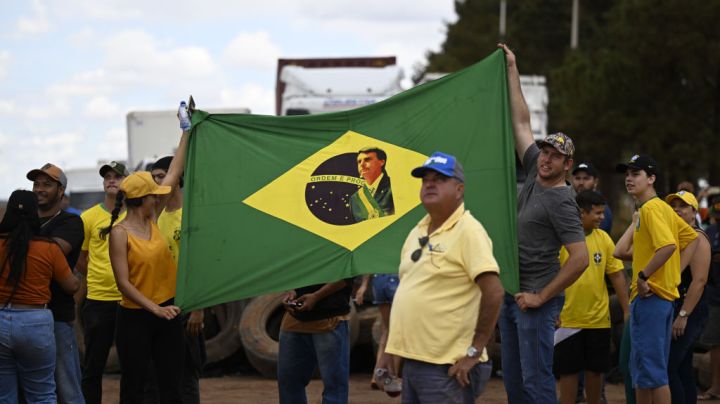Brazil Sees Protests Break Out After Bolsonaro Loss in Presidential Election

BRASILIA, BRAZIL - NOV 01 - Supporters of Brazil's President Jair Bolsonaro react, as they block highway BR-251 during a protest against President-elect Luiz Inacio Lula da Silva who won a third term following the presidential election run-off, in Planaltina, Brazil, November 1, 2022. (Photo by Mateus Bonomi/Anadolu Agency via Getty Images)
Brazil is looking towards a new future — and a new President. But with a divided country, the road towards that future might not be as easy as most would want it to be. In a move reminiscent of the days post Donald Trump’s loss to Joe Biden in the United States, Brazil’s President Jair Bolsonaro and his supporters seem unlikely to peacefully accept the win of Luiz Inácio Lula da Silva.
Monday (October 31) saw multiple roads blocked by truck drivers protesting the President’s loss in the October 30th election, with other protests breaking out at night. By noon Tuesday, highway police had removed more than 300 blockades, with at least 260 still in place around the country. But, even as police move to clear the rest off the road, by order of the Supreme Court, the political atmosphere remains charged – something that is unlikely to change in the near future.
President Jair Bolsonaro, after all, has yet to speak publicly since electoral results were released Sunday night. He also hasn’t called Lula to concede. This comes on the heels of President Bolsonaro questioning the reliability of the country’s electoral system, and claiming that electronic voting machines were prone to fraud. Like Trump, Bolsonaro was unable to present evidence of his claims, even when ordered to do so by the electoral court.
Brazil elected Luiz Inácio Lula da Silva by a very thin margin of 50.9% to 49.1%, the tightest presidential race since the end of the military dictatorship in 1985. And though by all official counts the election is now over and it’s time for the country to prepare for a peaceful transfer of power, it’s hard to trust things will proceed in an orderly fashion considering Bolsonaro’s previous statements and his current silence. Hopefully, though, Brazil has learned a lesson from the United States, and it can find a way to make the next few months go smoothly.
